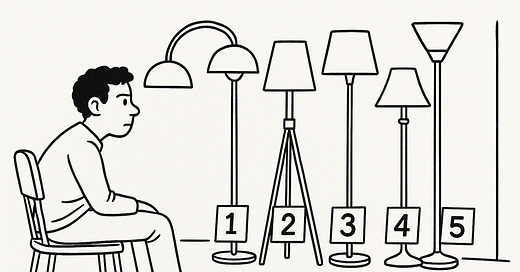How will AI change the economics of marketing? I will spare you the “Attention Is All You Need” jokes and get straight to it, since this is a serious topic with far-reaching implications. Marketing is a huge industry with many second-order effects. Like facilitating a “free” internet which underpins many of today’s most important developments. The “internet as a thing” ultimately supports how humans interact and network in a decentralized way.
To get a sense of the size, according to the AI, global ad spend was roughly 1% ($1.09T) of global GDP in 2024. Since 2014 it has been growing 2.8x faster than global GDP and in that time the mix has flipped, so that internet ads now account for 73% of the total. In this landscape ads take several forms: search ads, social media posts, video ads, banners, native content, and increasingly ads on shopping sites and influencer promotions.
Now, let’s consider the consumer experience with the most advanced (for now) tools like OpenAI’s Deep Research, and Exa’s Websets where you prompt the AI “help me buy a standing lamp”, and then it goes off and searches the web trying to satisfy your request. What is being automated here? AI is automating the drudgery of compiling lists of goods and services online. This is a real time saver. As an exercise, compile a list (for time) of 15 standing lamps. So, the UX will largely revolve around lists.
From the merchant’s perspective, first you need to get onto the list. This probably means an evolved kind of SEO which relies on word embeddings and keywords. Businesses will need to be more online, meaning having a website, social media and content to make themselves more discoverable to the AIs. Since lists are the form factor, what matters is winning out vis-à-vis your fellow list entries. My sense is that the fundamentals will not change: quality, price, positive online reviews, branding and traditional advertising (“trad-ad” if you will) to establish your brand. Ideally they would know about you before you appear on their list. So, ironically, everything that mattered, still matters, just more. The comparisons will be starker, like a police lineup.
OpenAI is rumoured to be preparing to integrate ads into the experience, this may change things slightly. Maybe you’ll have “sponsored” list entries at the top, but it will still be a list. Also, Stripe has spoken about enabling AI agents to make purchases on your behalf, however this doesn’t seem to conflict with my theory of lists. In their demo we see that customers still make the decision, the agents are just now handling the checkout experience.
Perhaps the primary trend unfolding is that the ability to evaluate and compare things (people included) online will become easier. This may have uncomfortable cultural consequences, as noted by Tyler Cowen:
But there's something oppressive about it. Because all the mistakes you make get recorded; they get measured. And we're not used to that. We're used to a lot of things being overlooked […] So, we’re programmed to hold things against people and we’re going to have to back out of that much more, I don’t think that will be so easy.
— Tyler Cowen (2013). EconTalk: Inequality, the Future, and Average is Over.
Obviously this is relevant in politics too. So buckle up!



